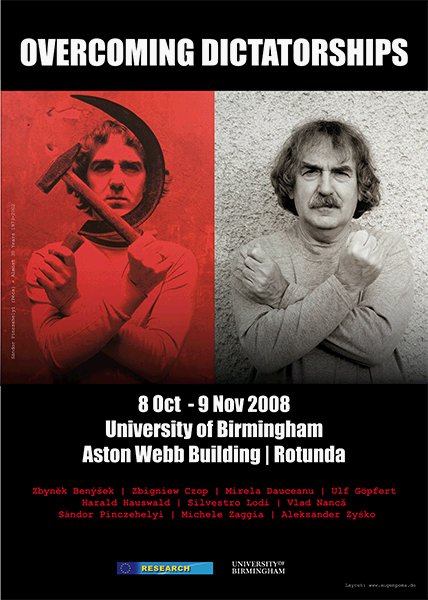Overcoming Dictatorships
dal 7/10/2008 al 8/11/2008
Segnalato da
Zbynek Benysek
Zbigniew Czop
Mirela Dauceanu
Ulf Gopfert
Harald Hauswald
Silvestro Lodi
Vlad Nanca
Sandor Pinczehelyi
Michele Zaggia
Aleksander Zysko
7/10/2008
Overcoming Dictatorships
University of Birmingham, Birmingham
Round table discussion - conference - exhibition. The project explores art produced in response to the collapse of political authoritarian systems, particularly those of the Soviet bloc in 1989. It aims to create a dialogue on post-dictatorial experiences among participants from countries designated as Eastern and Western Europe. The 17 works deal with processes of mourning, remembering and overcoming the past.

Details of the DISCUSSION, CONFERENCE & EXHIBITION
Art Groups in Eastern Europe in the 1990s and 2000s (Round table discussion)
With artists whose works will be shown in Overcoming Dictatorships. Chaired by the off-site curator of the Ikon Gallery Helen Legg, it will focus on up and coming contemporary art groups in post-Communist countries and draw parallels with the situation immediately after 1989, when the former underground art replaced the official.
Roles of the Visual in Overcoming Dictatorships (conference)
The conference (organised to mark the opening of the exhibition Overcoming Dictatorships, Aston Webb Building, University of Birmingham, Birmingham, 9 Oct.-9 Nov. 2008) will explore the intersections of the visual arts in mediating the political, socio-economic and cultural changes in post-dictatorial societies and the impact of such changes on cultural production. It brings together a select group of speakers whose research explores aspects of overcoming totalitarian and authoritarian systems in different disciplines but with a focus on the visual arts (and an emphasis on the period since 1989).
Dr. Sue Malvern (University of Reading) will examine works by women artists in Croatia, Serbia and Slovenia and their legacies of feminism and dissidence in post-Communist Europe, while Maja Fowkes (UCL) and Dr. Reuben Fowkes (Manchester Metropolitan University and initiators of SocialEast Forum) will explore the reluctance to deal with live political questions through the case of Hungarian artist Csaba Nemes, asking whether it reflects more the legacy of local (art) histories or the newly-adopted rules of a politically acquiescent international art system. Dr. Rose Whyman (University of Birmingham) will consider trends in counter-culture art since the 1990s in Russia and Prof. Brandon Taylor (University of Southampton) will discuss the artistic culture of the British monarchy in recent decades to locate the 'Dictatorship of the Bourgeoisie'. The concluding panel discussion will be chaired by Prof. Cillian Ryan (University of Birmingham).
The opening of the exhibition by Professor Dr. Dr. Gerhard Besier (Chair in European Studies, Technische Universität, Dresden and main investigator of the project which this exhibition is part of), Rt. Hon. Neil Kinnock (Leader of the Opposition, 1983-92 and UK Commissioner of the EU, 1995-2004) and Professor Michael Sterling (Vice-Chancellor) is part of the conference.
Overcoming Dictatorships (exhibition)
The exhibition explores art produced in response to the collapse of political authoritarian systems, particularly those of the Soviet bloc in 1989. It aims to create a dialogue on post-dictatorial experiences among participants from countries designated as 'Eastern' and 'Western' Europe. The 17 works deal with processes of mourning, remembering and overcoming the past. They critique old collective identity formations (i.e. the Soviet bloc, National Socialism and Fascism), questioning western political and socio-economic uniformities (including the EU) and critically engage with 'new' dictatorships such as consumerism, globalisation and mass media.
Overcoming Dictatorships aims to challenge compartmentalised thinking and thus attempts to overcome authoritarian systems.
Starting in Birmingham, where the exhibition will be opened by Professor Dr. Dr. Gerhard Besier (Chair in European Studies, Technische Universität, Dresden and main investigator of the project which this exhibition is part of), Rt. Hon. Neil Kinnock (Leader of the Opposition, 1983-92 and UK Commissioner of the EU, 1995-2004) and Professor Michael Sterling (Vice-Chancellor of the University of Birmingham), this exhibition will travel to galleries in several European countries.
Artists participating in the exhibition: Zbynĕk Benýšek - Zbigniew Czop - Mirela Dauceanu - Ulf Göpfert - Harald Hauswald - Silvestro Lodi - Vlad Nancă - Sándor Pinczehelyi - Michele Zaggia - Aleksander Zyśko.
The exhibition is part of the EU-funded project (scheme: Culture 2000) on 'Overcoming Dictatorships – the Encounter of Poets, Artists and Writers' (main investigator/lead partner: Prof. Dr. Dr. Gerhard Besier, Chair in European Studies, Technische Universität, Dresden).
For information on the project, see the project website http://lehrstuhl-europastudien.eu/eu/ and the artists' blog http://overcomings.blogspot.com/.
Important dates:
Exhibition: Overcoming Dictatorships, 9 Oct. – 9 Nov. 2008
(The Rotunda Gallery, Aston Webb Building, The University of Birmingham, Mon – Fri, 10 am-5pm; closed weekends, Admission Free)
Round table discussion with the participating artists of Overcoming Dictatorships, 8 Oct. 2008, 6.30pm
(Ikon Gallery, 1 Oozells Square, Brindley Place, Birmingham, B1 2HS, 0121 248 0708 ∙ www.ikon-gallery.co.uk ∙ no booking required)
Roles of the Visual in Overcoming Dictatorships, 9 Oct. 2008, 9am - 4pm (conference on the occasion of the opening of the exhibition Overcoming Dictatorships)
(Department of History of Art, The University of Birmingham
Edgbaston, Birmingham, B15 2TT)
Fully booked
Funded by the EU and CRN (Heritage, Cultural Production and Interpretation Collaborative Research Network of the University of Birmingham)
Round table discussion with the participating artists of Overcoming Dictatorships, 8 Oct. 2008, 6.30pm
Ikon Gallery, http://www.ikon-gallery.co.uk
Roles of the Visual in Overcoming Dictatorships, 9 Oct. 2008, 9am - 4pm, Department of History of Art, The University of Birmingham
Image: Sandor Pinczehelyi, Almost 30 Years, 1973-2002
University of Birmingham - Department of History of Art
Birmingham
Mon – Fri, 10 am-5pm; closed weekends



